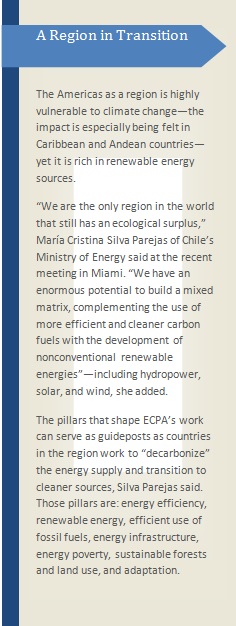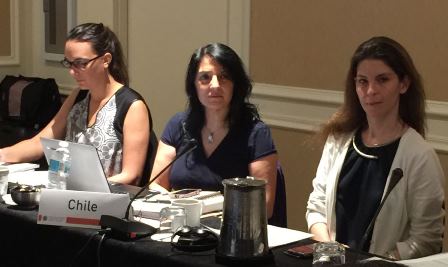
Like any major change, the transition to cleaner energy is going to take some hard work. In preparation for next year’s ECPA ministerial meeting—which will focus on the “Energy Transition in the Americas”— representatives from across the hemisphere met to brainstorm about some of their countries’ main challenges and priorities.
 The preparatory meeting, held in Miami on October 20, brought together representatives from 19 countries in the region to begin discussing what they want to accomplish at the Third Ministerial Meeting of the Energy and Climate Partnership of the Americas (ECPA). Chile will host the ministerial, which will take place in September or October 2017 and will include the participation of energy ministers and other high-level officials in charge of energy, environmental, and related issues.
The preparatory meeting, held in Miami on October 20, brought together representatives from 19 countries in the region to begin discussing what they want to accomplish at the Third Ministerial Meeting of the Energy and Climate Partnership of the Americas (ECPA). Chile will host the ministerial, which will take place in September or October 2017 and will include the participation of energy ministers and other high-level officials in charge of energy, environmental, and related issues.
The overarching theme, “Energy Transition in the Americas,” reflects the shared vision of moving toward cleaner energy sources, yet leaves room to explore specific topics of interest to different countries and subregions, explained Corissa Petro, Coordinator of the International Department in Chile’s Energy Ministry. She invited participants at the Miami meeting to talk about some of the priorities in their own countries, to help ensure a ministerial meeting “that’s of interest, that’s relevant, and that leaves a legacy that all of us are going to be happy with in the end.”
During the wide-ranging discussion, participants mentioned a range of concerns, from the importance of investing in new technologies to the need to reduce the use of firewood for fuel. One thorny issue many participants raised was transportation—in some countries, the biggest source of greenhouse gas emissions and one of the hardest to tame.
In the case of the Organisation of Eastern Caribbean States, around 12 to 14 percent of GDP goes toward importing fossil fuels for both the transportation and electricity sectors, with most of that (10 percent) going to transportation, noted Sylvester Clauzel, permanent secretary in Saint Lucia’s Ministry of Sustainable Development, Energy, Science and Technology.
In the case of Saint Vincent and the Grenadines—a country with 32 islands and cays—marine transportation is a critical aspect of the equation, said Ellsworth Dacon, director of the Energy Unit in the Ministry of National Security.
Isaac Castillo, Panama’s deputy energy secretary, called transportation the “bête noire” of oil consumption and said his country is working on three priorities in this sector: using government fleets more efficiently; increasing the use of biofuels, compressed natural gas, and other cleaner fuels; and improving public transportation options.
Some countries are exploring the possibility of introducing electric vehicles, but that might not be a good solution if most of the country’s electricity is generated from fossil fuels. It’s important to take a “holistic” view and look at where the electricity comes from, said Canada’s representative at the meeting, Laurent Morel-à-l’Huissier of the Consulate General of Canada in Miami.
In Uruguay, electric vehicles do make sense because more than 90 percent of the electric grid is based on renewable sources, said Carolina Mena, a senior energy specialist in Uruguay’s Ministry of Industry, Energy, and Mining. Some pilot projects are underway involving electric taxis and buses, but the country’s small size presents its own challenges for drumming up market interest, she said. It would be helpful for countries to exchange more information about what progress they have been making in this area and what obstacles they have overcome, she added.
 Complicating the issue of energy use in transportation is that decisions often involve multiple agencies and levels of government, at the local, provincial, and national level. Chile’s Corissa Petro suggested that the participants think about possible joint strategies between ministries of energy and ministries of transport.
Complicating the issue of energy use in transportation is that decisions often involve multiple agencies and levels of government, at the local, provincial, and national level. Chile’s Corissa Petro suggested that the participants think about possible joint strategies between ministries of energy and ministries of transport.
Of course, transportation is hardly the only issue of concern related to energy. Here are just a few of the topics participants raised in their brainstorming session:

In the coming weeks, participants will flesh out some of these ideas in concept papers for more extensive discussion at the next preparatory meeting, expected to be held in March or April of next year. In the meantime, the ECPA Steering Committee—currently led by Chile, with the additional participation of the Dominican Republic, Jamaica, Mexico, the United States, and Trinidad and Tobago—will continue to work on updating the ECPA Action Plan and shaping an effective agenda that builds on the progress made since the Second Ministerial Meeting held in Mérida, Mexico, in 2015.
The transition to cleaner energy is the responsibility of all countries, said Alan Yu, deputy assistant secretary of the U.S. Department of Energy, speaking in Miami to the ECPA Steering Committee. “ECPA was founded upon the premise that there are no senior and junior partners, but equal partners,” he said. “In this regard, our governments’ commitment to implement the United Nations Sustainable Development Goals, as well as the obligations derived from the Paris Agreement on climate change, demand a sense of shared responsibility and a contribution of every country within its means.”
 View Map
View Map